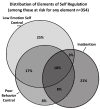Longitudinal Predictors of Self-Regulation at School Entry: Findings from the All Our Families Cohort
- PMID: 33081229
- PMCID: PMC7602711
- DOI: 10.3390/children7100186
Longitudinal Predictors of Self-Regulation at School Entry: Findings from the All Our Families Cohort
Abstract
Self-regulation is the ability to manage emotions, modulate behaviors, and focus attention. This critical skill begins to develop in infancy, improves substantially in early childhood and continues through adolescence, and has been linked to long-term health and well-being. The objectives of this study were to determine risk factors and moderators associated with the three elements of self-regulation (i.e., inattention, emotional control, or behavioral control) as well as overall self-regulation, among children at age 5. Participants were mother-child dyads from the All Our Families study (n = 1644). Self-regulation was assessed at age 5. Risk factors included income, maternal mental health, child sex, and screen time, and potential moderation by parenting and childcare. Adjusted odds ratios of children being at risk for poor self were estimated using multivariable logistic regression. Twenty-one percent of children had poor self-regulation skills. Risk factors for poor self-regulation included lower income, maternal mental health difficulties, and male sex. Childcare and poor parenting did not moderate these associations and hostile and ineffective parenting was independently associated with poor self-regulation. Excess screen time (>1 h per day) was associated with poor self-regulation. Self-regulation involves a complex and overlapping set of skills and risk factors that operate differently on different elements. Parenting and participation in childcare do not appear to moderate the associations between lower income, maternal mental health, male sex, and screen time with child self-regulation.
Keywords: child behavior; child development; longitudinal cohort; parenting; screen time; self-regulation.
Conflict of interest statement
The authors declare no conflict of interest.
Figures


Similar articles
-
Prospective associations between child screen time and parenting stress and later inattention symptoms in preschoolers during the COVID-19 pandemic.Front Psychol. 2023 May 25;14:1053146. doi: 10.3389/fpsyg.2023.1053146. eCollection 2023. Front Psychol. 2023. PMID: 37303895 Free PMC article.
-
Onset and persistence of childhood asthma: predictors from infancy.Pediatrics. 2001 Oct;108(4):E69. doi: 10.1542/peds.108.4.e69. Pediatrics. 2001. PMID: 11581477
-
Interactive effects of parenting behavior and regulatory skills in toddlerhood on child weight outcomes.Int J Obes (Lond). 2019 Jan;43(1):53-61. doi: 10.1038/s41366-018-0162-6. Epub 2018 Jul 19. Int J Obes (Lond). 2019. PMID: 30026591 Free PMC article.
-
Adolescent mothers and their children: changes in maternal characteristics and child developmental and behavioral outcome at school age.J Dev Behav Pediatr. 1996 Jun;17(3):162-9. J Dev Behav Pediatr. 1996. PMID: 8783062
-
Maternal depression in early childhood and child emotional and behavioral outcomes at school age: examining the roles of preschool childcare quality and current maternal depression symptomatology.Eur Child Adolesc Psychiatry. 2020 May;29(5):637-648. doi: 10.1007/s00787-019-01385-7. Epub 2019 Aug 13. Eur Child Adolesc Psychiatry. 2020. PMID: 31410578
Cited by
-
Longitudinal associations between digital media use and ADHD symptoms in children and adolescents: a systematic literature review.Eur Child Adolesc Psychiatry. 2024 Aug;33(8):2503-2526. doi: 10.1007/s00787-022-02130-3. Epub 2022 Dec 23. Eur Child Adolesc Psychiatry. 2024. PMID: 36562860 Free PMC article.
-
Factors of Having Difficulties Raising 3-Year-Old Children in Japan: Usefulness of Maternal and Child Health Information Accumulated by the Local Government.Children (Basel). 2021 Nov 24;8(12):1084. doi: 10.3390/children8121084. Children (Basel). 2021. PMID: 34943280 Free PMC article.
-
Prospective associations between child screen time and parenting stress and later inattention symptoms in preschoolers during the COVID-19 pandemic.Front Psychol. 2023 May 25;14:1053146. doi: 10.3389/fpsyg.2023.1053146. eCollection 2023. Front Psychol. 2023. PMID: 37303895 Free PMC article.
-
The role of emotional regulation on early child school adjustment outcomes.Arch Psychiatr Nurs. 2024 Aug;51:201-211. doi: 10.1016/j.apnu.2024.07.003. Epub 2024 Jul 2. Arch Psychiatr Nurs. 2024. PMID: 39034079 Free PMC article.
-
Early Digital Engagement Among Younger Children and the Transformation of Parenting in the Digital Age From an mHealth Perspective: Scoping Review.JMIR Pediatr Parent. 2025 Jul 3;8:e60355. doi: 10.2196/60355. JMIR Pediatr Parent. 2025. PMID: 40608493 Free PMC article. Review.
References
-
- Morrison F., Ponitz C.C., McClelland M. Self-regulation and academic achievement in the transition to school. In: Calkins S., Bell M., editors. Child Development at the Intersection of Emotion and Cognition. American Psychological Association; Washington, DC, USA: 2010. pp. 203–224.
-
- Campbell S.B., Denham S.A., Howarth G.Z., Jones S.M., Whittaker J.V., Williford A.P., Willoughby M.T., Yudron M., Darling-Churchill K. Commentary on the review of measures of early childhood social and emotional development: Conceptualization, critique, and recommendations. J. Appl. Dev. Psychol. 2016;45:19–41. doi: 10.1016/j.appdev.2016.01.008. - DOI
Grants and funding
LinkOut - more resources
Full Text Sources

